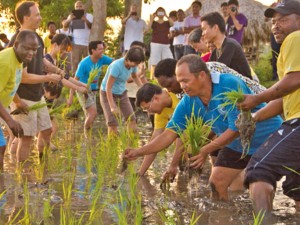Singapore graduate students have more fun in Bicol town

PLANTING RICE IS FUN IN ALBAY Who said planting rice is never fun? These graduate students from the National University of Singapore do not think so as they learn how to plant rice during a visit to Libon, Albay, this month. Among the graduate students is the Nigerian Ambassador to Japan Emmanuel Oseimiegha Otiootio (at left). JAMES JOHN P. DYCOCO/CONTRIBUTOR
Libon, a small but rich agricultural town in the third district of Albay province, has the potential to become a rural tourism hub in the Bicol region.
A group of senior management students from Singapore’s foremost university, who recently visited the province in June, thinks so.
The 27-member Senior Management Program (SMP) students of the Lee Kwan Yew School of Public Policy (LKY SPP) of the National University of Singapore, which ranks No. 2 among the top universities in Asia, reached this conclusion following a weeklong visit to Albay from June 17 to 22, said the group’s professor, Scott Fritzen.
The students, senior government and private firm officials from Singapore, Hong Kong, China, Botswana, Nigeria, Australia and United Kingdom, said farming, fishing, beach resorts and seaports are the likely areas for investments that could develop Libon as Albay’s rural tourism hub.
Libon, with 4,000 hectares of rice fields, produces 30.4 million kilograms of palay per year and is considered the “rice granary” of Albay.
Rice festival
It also hosts the P200-million Pantao Port, a regional port that links Masbate province and the Visayas and Mindanao to mainland Bicol, Southern Luzon and the National Capital Regions.
Libon, located 45 kilometers from Legazpi City, celebrates a yearly “Paroy” (rice) Festival in the last week of June, showcasing the town’s sociocultural traditions, highlighted by the rice and vegetable harvest.
Fritzen said the group was impressed with the way local government officials led by Libon Mayor Agnes Dycoco addressed the challenges confronting the town.
Nigerian Ambassador to Japan Emmanuel Oseimiegha Otiootio, a member of the group, said he enjoyed their field trip to the town’s rice paddies where the students experienced planting rice in knee-deep mud.
“Indeed planting rice is fun in Libon,” said Otiootio chanting the country’s tourism slogan.
Fritzen said the case study initiated by Dycoco, who is the lone Filipino in the SMP program, and validated by the visiting students, revealed that the town needs to develop an investment plan that would implement an integrated area development focused on rural tourism, food processing industry and infrastructure.
First-class town
Libon is a first-class town (2011 income: P100 million) with a total population of 71,527 living in 47 villages, 22 of which are rice-producing. Natural beaches and caves thrive in the villages of Rawis, Talin-talin, Tambo and Pantao. Rawis has a beach resort where visitors/tourists can swim on the “Lulobog-lilitaw Island.”
The SMP class is composed of 15 Singaporeans, four from Botswana, three Chinese, two from Hong Kong, the Nigerian ambassador to Japan, one from England and an Australian.
The visit validated facts and figures in the case study titled “The Municipal Governance of Libon: Sustaining Municipal Programs.”
“Their visit is to validate what they’ve read and seen in the case, talk with actual stakeholders, visit sites and address challenges. Particularly, four development areas—education, health, water and sanitation, social welfare; and an age-demographics of 0-18 years old, which comprise 51 percent of our total population,” said Dycoco, the only Filipino in the class of the sixth SMP batch in July 2011, and only the fifth Filipino in the program.
Power group
Dycoco said SMP was of limited admission, ensuring that participants are senior in experience, from private, government and civic sectors, and varied in fields of endeavor.
“This is practically a convergence of field experts from various countries. The lecturers are all practitioners in their fields and have graduated from internationally renowned universities,” she added.
The National University of Singapore was recently adjudged by an international research organization, Quacquarelli Symonds Intelligence Unit (QSIU), as No. 2 on the list of top 150 universities in Asia.
QSIU ranks the universities based on these indicators: 30 percent academic reputation from global survey, 30 percent papers per faculty and citations per paper, 20 percent faculty-student ratio, 10 percent employer reputation from global survey, and 10 percent proportion of international faculty and students and proportion of inbound and outbound exchange students.